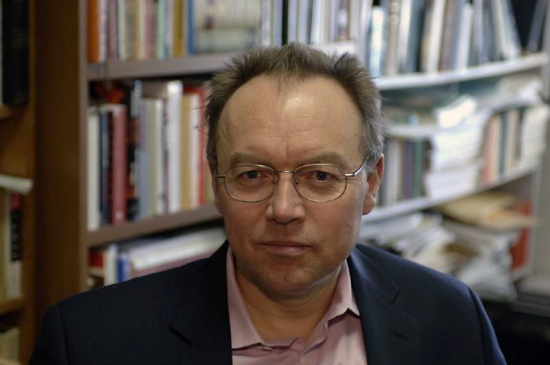Healing Poland
Igor Lukes on the pain and an eerie historical parallel

How does Poland rebuild a government after a plane crash on April 10 wiped out its president and dozens of leaders, all flying to a commemoration of the Katyn massacre, long denied by Russia? Rebuilding, says foreign affairs expert Igor Lukes, is the easier task. The real challenge will be healing the wound to Poland’s heart. To explain, Lukes strays outside his discipline into poetry.
The professor of international relations and history at the College of Arts & Sciences has a hand-copied translation of Zbigniew Herbert’s “Buttons,” about the 1940 massacre of 20,000 Polish troops by the Soviets in Russia’s Katyn Woods: Only the buttons were relentless / Survived and now turn up, unbent eyewitnesses to buried crimes / The mass graves’ only monument …
“I was born in Czechoslovakia, so although I’m not a Pole, I fully share this sentiment of ‘damned’ Katyn,” says Lukes. “Herbert’s uncle died at Katyn. Show me a Polish family, and chances are good that one of their extended family is linked to this tragedy.”
BU Today spoke with Lukes about fallout from the tragic crash and Poland’s long and emotional road ahead.
BU Today: How is the Polish government doing in terms of rebuilding?
Lukes: Poland has showed a vibrant democracy. The constitutional succession kicked in. Bitter political rivals were united by this tragedy. The executive powers of the state were immediately transferred to the president of the senate, Bronislaw Komorowski, who assumed the powers of president. He is obligated to organize a presidential election within 74 days.
The prime minister and his cabinet, who run the government day to day, were not on the plane. Will average Poles see any disruption?
Certainly not. The only positive aspect is that the Polish democratic system, in place for only 20 years, has withstood this test. Civil servants are, quite frankly, replaceable. It’s even more true in the military, because the military has a line of succession, and they are used to taking casualties, especially the Polish army.
I expect the presidential campaign is going to be more gentle and civilized, because in this tragedy, rivals are going to be less vicious. The president and president of the senate despised each other.
There is a chilling historical parallel with a World War II crash.
After the Katyn massacre, the Polish government in exile requested that a commission under the Red Cross look into the allegations by the Nazis of Russian guilt. Prime Minister Wladyslaw Sikorski stopped in Gibraltar. As the plane took off, the pilot reported that the stick was locked. The plane crashed into the sea. Sikorski died, as did his entourage. There has never been any proof, but one speculation has been the Soviet secret service was involved in sabotaging the plane.
Tell us a bit about the emotional significance for Poles of the death in this crash of Anna Walentynowicz, the shipyard worker whose firing led eventually to such monumental change in Poland.
That incident triggered the strike that evolved into the Solidarity trade union movement in 1980. A gutsy, gutsy woman who stood up to that regime. If there had been a Polish Woody Guthrie, there would have been songs about Walentynowicz.
These civilians on the airplane are poignant. When the space shuttle exploded in the 1980s, one of the crew was a teacher. The American public focused on her more than the military people who died.
What effect is the tragedy likely to have on Poland’s stands on international issues?
The impact will be real. President Lech Kaczynski detested the Russians, being a vigorous critic of the Stalinist legacy he saw in people like Putin. He was a Polish patriot. As far as Kaczynski was concerned, World War II ended yesterday. He was bitter about the German role in the destruction of Poland. He never hesitated to point it out, in the face of German politicians. You don’t bring up the ghosts of World War II in today’s European Union. When the budget was being debated, Kaczynski said, “The reason Poland now has fewer people is because you people killed so many Poles. If they had been alive, they would have had children.” The others were looking at him in disbelief.
He believed Brussels was in the pocket of the French, British, and Germans, so he resented Brussels, too. America could not have had a closer ally. He devoted so much energy to having the United States create military bases. Other countries resent foreign army presence.
Whoever takes over will probably be more diplomatic. However, Polish-American relations are not a reflection of the personal preferences of a few politicians. The love of America is in the Polish DNA.
Rich Barlow can be reached at barlowr@bu.edu.

Comments & Discussion
Boston University moderates comments to facilitate an informed, substantive, civil conversation. Abusive, profane, self-promotional, misleading, incoherent or off-topic comments will be rejected. Moderators are staffed during regular business hours (EST) and can only accept comments written in English. Statistics or facts must include a citation or a link to the citation.